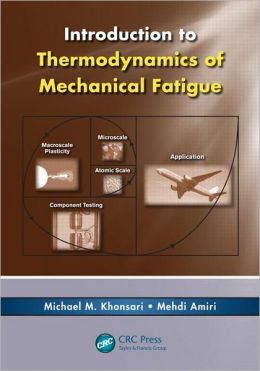 [内容简介]
[内容简介]
Fatigue is probabilistic in nature and involves a complex spectrum of loading history with variable amplitudes and frequencies. Yet most available fatigue failure prediction methods are empirical and concentrate on very specific types of loading. Taking a different approach, Introduction to Thermodynamics of Mechanical Fatigue examines the treatment of fatigue via the principles of thermodynamics. It starts from the premise that fatigue is a dissipative process and must obey the laws of thermodynamics. In general, it can be hypothesized that mechanical degradation is a consequence of irreversible thermodynamic processes. This suggests that entropy generation offers a natural measure of degradation.
An Entropic Approach to Fatigue and Degradation
Drawing on recent cutting-edge research and development, the authors present a unified entropic approach to problems involving fatigue. They introduce the fundamentals of fatigue processes and explore a wide range of practical engineering applications.
Fundamental Concepts and Methodologies
The book reviews commonly observed failure modes, discusses how to analyze fatigue problems, and examines the deformation characteristics of a solid material subjected to fatigue loading. It also looks at how to use thermodynamics to determine the onset of fatigue failure. In addition, the book presents methodologies for improving fatigue life and for accelerated fatigue testing.
Learn How to Apply the Entropic Approach to Fatigue Problems
Comprehensive and well organized, this work helps readers apply powerful thermodynamics concepts to effectively treat fatigue problems at the design stage. It offers an accessible introduction to a new and exciting area of research in the field of fatigue failure analysis.
[目录]
Introduction to Mechanical Degradation Processes
Fatigue
Fracture
Wear
Fretting
Brinelling and False Brinelling
Corrosion
Creep
Thermal Shock
Impact
References
Fundamentals of Thermodynamics
Open and Closed Systems
Equilibrium and Nonequilibrium State
Steady and Unsteady State
Stable and Unstable State
The First Law of Thermodynamics
The Second Law of Thermodynamics
Entropy Flow and Entropy Generation
Entropy Balance Equation
References
Degradation-Entropy Generation (DEG) Theorem
Thermodynamic Forces and Flows
Relations between Thermodynamic Forces and Flows
The Degradation–Entropy Generation Theorem
References
Fatigue Mechanisms: An Overview
Multiscale Characteristics of Fatigue
Parameters Influencing Fatigue and Classification of Regimes
Fatigue and Energy Dissipation
Fatigue-Temperature Rise
References
Basic Thermodynamic Framework for Fatigue Analysis
Entropy Balance Equation of a Deformed Body
Entropy Change of a Thermally Deformed Solid
Clausius–Duhem Inequality
Thermodynamic Forces and Flows in Fatigue
References
Thermodynamic Assessment of Fatigue Failure
Limitation of Conventional Methods and the Need for Further Advances
Evaluation of Entropy Generation and Entropy Flow
Time to Failure
References
Damage Mechanics: An Entropic Approach
Introduction to Damage Mechanics
Continuum Damage Mechanics (CDM)
References
Self-Organization in Fatigue
Introduction to Self-Organization
Effect of Electric Current on Fatigue Life
Effect of Magnetic Field on Fatigue Life
Effect of Environment (Surface Cooling) on Fatigue Life
Self-Organization and Complexity
References
Entropic Fatigue: In Search for Applications
Application to Variable-Loading Amplitude and Structural Health Monitoring
Accelerated Fatigue Testing
Concluding Remarks
References
Index

 新书报道
新书报道